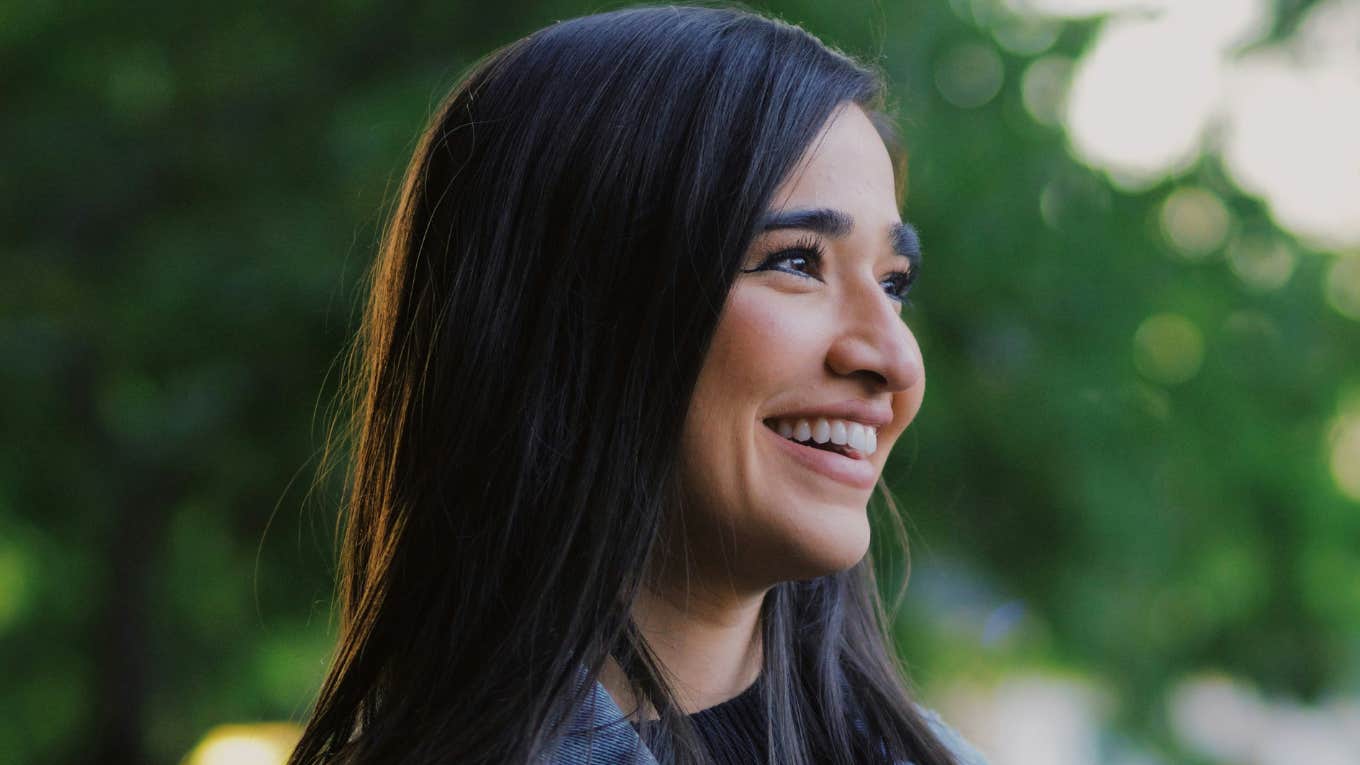The Art Of Being An Optimist: 12 Simple Habits Of Naturally Optimistic People
For some people, happiness is their natural state.
 Fabian Centeno | Unsplash
Fabian Centeno | Unsplash If there’s one single characteristic that’s carried me through every terrible date, bitter break-up, sleeping with my ex, and trying my hardest not to give up on this elusive thing called love, it’s my eternal optimism. Know that emoji that’s smiling and has hearts for eyes? That’s me.
Being an eternal optimist means always looking on the bright side and having hope, no matter what obstacles might attempt to push you off your path. Optimism is incredibly attractive. In fact, more than anything else I value in a future partner — and in myself — is a person’s ability to see the bright side of things and to put others before himself to bring a bit more happiness into the world.
I've been called a little naive before and told that I look through rose-colored glasses, but what can I say? I like the view from here! It’s positive, encouraging, and keeps me keepin’ on.
Here are 12 simple habits of naturally optimistic people:
1. They don’t understand or tolerate constant negativity
I’ve had a few boyfriends who were so incredibly draining that they put me in a bad headspace. I noticed it — and so did my friends and family — and it was a big reason why those relationships ultimately ended.
Don’t get me wrong: I can be negative sometimes, too, but I'm really quick to snap out of it. Men who want to consistently complain, gripe, put themselves and everyone else down, and overall be a grouch are utterly exhausting to me.
2. They have an insane amount of energy
 baranq / Shutterstock
baranq / Shutterstock
Not only do I rock that weekday work groove, but I also freelance, manage my blog, walk my dog, sweat it out at five workout classes, meet my friends for dinner, go on a date or two, check-off my errands, pay my bills, balance my savings account and squeeze in a facial or a mani/pedi... every week.
And yes, I do sleep, but I don’t need much of the Zzzs. I like to live a lot of life, see all that I can, and experience every moment. So have your Netflix binge, but the next day, we’re totally going kickboxing.
3. They can't walk past a baby, a puppy, or a pretty blue sky
Trust me, I've tried. I see the baby coming in its stroller or wobbling on those chunky toddler legs, and I know the mature thing to do is to just keep walking, but then those cheeks smile at me, and I’m done for. The same goes for a puppy and for a clear blue sky with puffy clouds.
4. They're often sensitive
I'm not very good at sarcasm. I think it’s funny, but I’m not fluent, and sometimes it makes me feel uncomfortable. I also don’t respond well when someone can’t think of anything to say that’s kind, or they’re stuck in a downward-spiraling negativity rut. The only downward I really approve of is the downward dog. Namaste.
For highly sensitive people, the ability to recognize, understand, and manage one's own and others' emotions is not just important; it's a requirement. Research suggests that individuals high in both sensitivity and emotional intelligence are better able to regulate their emotions and achieve positive outcomes.
5. They like to make others happy
It’s a habit that’s hard to break, but one I know you’ll like: I’m going to surprise you with so many things. Like your favorite breakfast when you wake up, tickets to your favorite band, or a note tucked in your coat pocket.
6. They volunteer for too many things
I need to learn to put my hand down and relax instead of being first to lead something. It's just, well, I want to be part of everything. I hope you'll help me be a follower sometimes.
One study found that people who volunteered for at least two hours a week had higher levels of optimism, happiness, and a greater sense of purpose. This finding suggests a reciprocal relationship where volunteering fosters an optimistic outlook.
7. They don’t freak out often, but when they do, it's intense
Like any addict, when I’ve had too much of my optimism drug and suddenly find myself feeling negative, I come crashing down.
It’s messy, it’s snotty, it’s those big splashy tears and red-faced sighs that’ll make you think I’m having a panic attack. I’m not — I’m just getting it all out so I can get back to being that perky babe you love. Bear with me.
8. They don’t see life half-full; they see it overflowing with champagne
Research shows that optimists are more likely to focus on solutions, plan actions, and adapt by finding new goals after setbacks. While half-empty views are typically associated with pessimism, true optimism is about how one actively responds to challenges, not just the initial reaction.
9. They don’t just like romance, they expect it
 Dorde Krstic / Shutterstock
Dorde Krstic / Shutterstock
No, you don’t need to shower me with roses (tulips are fine), tell me I’m beautiful every waking second of every day (but like, a few times a week?), or read me poetry (unless it’s E.E. Cummings), but I won’t hate it if you do. And if you stop romancing me, I’ll probably notice and ask if the bodega stopped selling the $10 bouquets.
10. They do things without expecting much in return because it makes them happy
I engage in acts of kindness just to make people believe a little bit more in the magic of the universe. Nothing more or less. It's cheesy, but very sincere.
Research explained that it is possible to cultivate an optimistic and generous mindset through intentional practice. Acts of kindness, practicing gratitude, and reframing negative thoughts can increase a person's optimism and their capacity for selfless giving.
11. They believe in signs
Like that time I asked for a sign that love was coming, and my "Love Never Fails" plaque in my room came crashing down in the middle of the night a few hours later. Or right before something big happened in my life, I found a shiny penny. Signs are everywhere! (And yes, I’ll be pointing them out to you.)
12. They won’t give up on you
Because that’s just not in my vocabulary or my belief system. The best is always yet to come, no matter how great the good is now.
So, we might have our bad times, we may struggle, we may fight, we will likely not always get along, but through it all, the eternal optimist in me will never let us forget those two crazy kids who had enough faith in themselves to fall in love.
Lindsay Tigar is an experienced travel and lifestyle journalist, content strategist, and editor whose work has appeared in Travel + Leisure, Vogue, USA Today, Fast Company, and a myriad of other publications.

